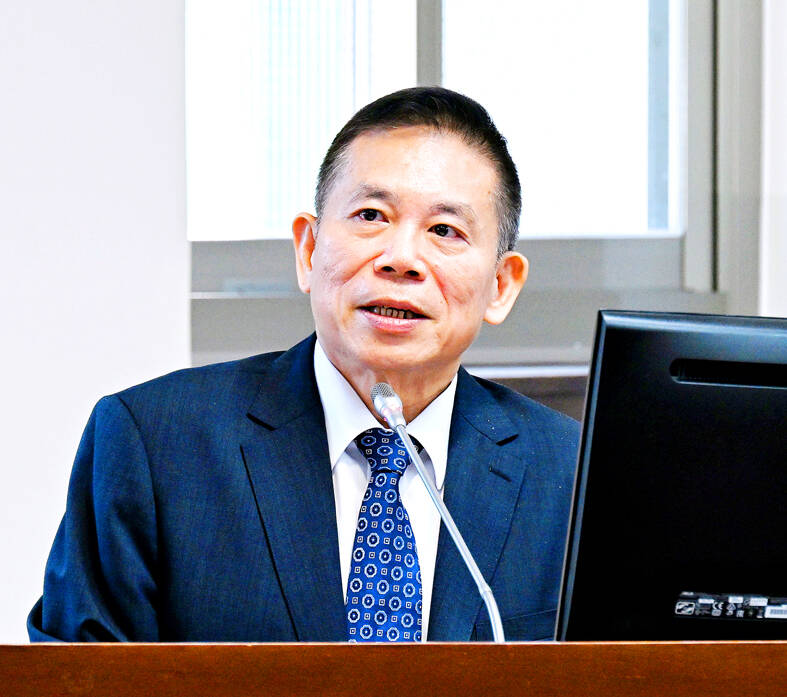Local chipmakers that have invested or pledged to invest in the US — including Taiwan Semiconductor Manufacturing Co (TSMC, 台積電) — are expected to be exempt from US President Donald Trump’s semiconductor tariffs, National Development Council (NDC) Minister Paul Liu (劉鏡清) said yesterday.
After Trump on Wednesday announced a 100 percent tariff on imported semiconductors, Liu told reporters ahead of a meeting of the legislature’s Economics Committee that Taiwanese chipmakers are seeking to lower tariff effects by building factories in the US, pursuing mergers and acquisitions to produce in the US, and forming partnerships with US firms.
For instance, United Microelectronics Corp (聯電), the nation’s second-largest contract chipmaker, might also reduce the effect of tariffs through its cooperation with Intel Corp, Liu said.

Photo: Sam Yeh, AFP
“Taiwan’s semiconductor industry is among the most resilient in the world... We have faith in our industry,” he said.
Regarding the potential effects of tariffs on the local chip industry and broader macroeconomic conditions, Liu said that most chips made by local manufacturers are for domestic assembly plants, with exports to the US last year of less than US$6 billion, excluding those from TSMC’s and GlobalWafers’ US facilities, which accounted for just 1.12 percent of total exports.
The impact is limited, he added.

Photo: Fang Pin-chao, Taipei Times
In general, semiconductor firms have said they can compete globally as long as tariff rates remain on a par with rivals, Liu said.
Liu, a TSMC board member, said that the company’s planned investment in Arizona is US$165 billion and the board has yet to discuss any extra investment in the US.
TSMC’s exports to the US accounted for just 1 percent of its total capacity, Liu said, adding that the figure is expected to rise to 6 percent by 2029.
Liu said he could not predict whether Trump would request additional investment from TSMC, but added that any decision would depend on sales and orders, as the firm is publicly listed and is accountable to its shareholders.
Trump has imposed a temporary 20 percent tariff on Taiwan, excluding semiconductors, as Taipei and Washington continue negotiations to reach a trade deal.
The government still expects GDP this year to reach 3.1 percent, despite the tariff impact, Liu said.
Responding to a leak of TSMC’s trade secrets related to the company’s advanced 2-nanometer technology, Liu said that the government would not permit leading-edge fabs to be built overseas.
TSMC is building 2-nanometer fabs in Taiwan and has plans for 1.4-nanometer fabs locally as well, he said.
With about 90 percent of TSMC’s research-and-development personnel and leadership team based in Taiwan, and more than six factories under construction in Kaohsiung, two in Chiayi County, and further investments planned in Tainan and Taichung, the government is committed to safeguarding key technologies, he said.
As small and medium-sized enterprises are unlikely to invest in the US, the government is allocating more than NT$95 billion (US$3.19 billion) to support them in the short term, while promoting artificial intelligence adoption to aid their business transformation in the long term, he added.

Authorities have detained three former Taiwan Semiconductor Manufacturing Co (TMSC, 台積電) employees on suspicion of compromising classified technology used in making 2-nanometer chips, the Taiwan High Prosecutors’ Office said yesterday. Prosecutors are holding a former TSMC engineer surnamed Chen (陳) and two recently sacked TSMC engineers, including one person surnamed Wu (吳) in detention with restricted communication, following an investigation launched on July 25, a statement said. The announcement came a day after Nikkei Asia reported on the technology theft in an exclusive story, saying TSMC had fired two workers for contravening data rules on advanced chipmaking technology. Two-nanometer wafers are the most

NEW GEAR: On top of the new Tien Kung IV air defense missiles, the military is expected to place orders for a new combat vehicle next year for delivery in 2028 Mass production of Tien Kung IV (Sky Bow IV) missiles is expected to start next year, with plans to order 122 pods, the Ministry of National Defense’s (MND) latest list of regulated military material showed. The document said that the armed forces would obtain 46 pods of the air defense missiles next year and 76 pods the year after that. The Tien Kung IV is designed to intercept cruise missiles and ballistic missiles to an altitude of 70km, compared with the 60km maximum altitude achieved by the Missile Segment Enhancement variant of PAC-3 systems. A defense source said yesterday that the number of

A bipartisan group of US representatives have introduced a draft US-Taiwan Defense Innovation Partnership bill, aimed at accelerating defense technology collaboration between Taiwan and the US in response to ongoing aggression by the Chinese Communist Party (CCP). The bill was introduced by US representatives Zach Nunn and Jill Tokuda, with US House Select Committee on the Chinese Communist Party Chairman John Moolenaar and US Representative Ashley Hinson joining as original cosponsors, a news release issued by Tokuda’s office on Thursday said. The draft bill “directs the US Department of Defense to work directly with Taiwan’s Ministry of National Defense through their respective

Tsunami waves were possible in three areas of Kamchatka in Russia’s Far East, the Russian Ministry for Emergency Services said yesterday after a magnitude 7.0 earthquake hit the nearby Kuril Islands. “The expected wave heights are low, but you must still move away from the shore,” the ministry said on the Telegram messaging app, after the latest seismic activity in the area. However, the Pacific Tsunami Warning System in Hawaii said there was no tsunami warning after the quake. The Russian tsunami alert was later canceled. Overnight, the Krasheninnikov volcano in Kamchatka erupted for the first time in 600 years, Russia’s RIA